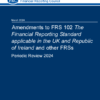
by John McCarthy Consulting Ltd. | Feb 25, 2020 | Blog, News
Many accountants and auditors are working hard this week to assist primary and post-primary schools around Ireland meet the 28 February 2020 deadline set by the Financial Support Services Unit (FSSU) for the filing of schools’ annual financial statements.
The Education Act, 1998 (the Act) is the relevant legislation that governs this area but it’s out of line with the latest thinking on accounting and legal language used in the Companies Act, 2014 in Ireland.
When compared to this later legislation, The Education Act is found to be inadequate in at least these three areas:
- The Act speaks about ‘all proper and usual accounts’ instead of ‘adequate accounting records’ used in the Companies Act, 2014;
- The Act, is vague about whether the financial statements should give a ‘true and fair view’, which, clearly, they should;
- The Act does not specify precisely the financial reporting framework that ought to be best applied to school accounting, which is now FRS 102, (The Financial Reporting Standard Applicable in the UK and the Republic of Ireland).
This single financial reporting standard applies to the financial statements of entities that are not applying EU-adopted IFRS, FRS 101 or FRS 105. It came into being in 2015, and Section 1A of that Standard came into being in January 2017, well after the Education Act was written. FRS 102 replaced the earlier version of Irish Generally Accepted Accounting Practice (GAAP), to which the Act refers, which had been in place for about 45 years.
New International Audit Standards (ISAs) were enacted for Ireland in June 2016 and the Act does not refer to these either.
Interim solution for Accountants / Auditors
Clearly the Education Act, 1998 needs a refresh from an accounting and audit perspective. In the meantime, these deficiencies are causing a technical difficulty for reporting accountants and auditors in helping schools meet the February deadline.
In an effort to help reporting accountants with this work, we have created a set of four templates, which address the inadequacies of the Act and clarify state how best to achieve a true and fair view in the midst of these inadequacies, through greater disclosure etc.
The templates are:
- Audit assignment engagement letter template under FRS 102
- Audit assignment representation letter template under FRS 102
- Audit exempt compilation assignment engagement letter template under FRS 102
- Audit exempt compilation assignment representation letter template under FRS 102
They templates are available for purchase on our website here for €50 each and may be downloaded immediately as Word templates for easy adaptation.
Have you prepared an AML Business-Wide Risk Assessment which is required if you have an AML Inspection visit? There is a template available and a webinar on how to prepare it. Both of these help firms comply with the latest requirements of Section 30A of the Criminal Justice (Money Laundering and Terrorist Financing) Acts, 2010 to 2018.
For many other webinar topics including Investment Property Accounting, FRS 105, Common Errors in FRS 102 Accounting and the latest on FRS 105 and company law, visit our online webinar training website.

by John McCarthy Consulting Ltd. | Feb 17, 2020 | Blog, News
One of the most common types of lease incentive is where a landlord allows a business tenant a period of time rent free, often at the commencement of the lease. This is to incentivise the tenant to occupy the premises.
Typically, FRS 102 spreads the implicit gain (to the lessee) and the cost (to the landlord), arising from this rent free period, on a straight-line basis over the lease term and therefore as a reduction to the overall lease expense (FRS 102.20.15A). The treatment was different in old GAAP. The rent free period is known as a ‘lease incentive’ (as defined in the glossary of FRS 102).
Requirements
With any lease, it must be determined whether it is a finance lease or operating lease – the guidance for this assessment is detailed in FRS 102.20.5.
Assuming the lease is an operating lease (i.e. it does not transfer substantially all the risks and rewards incidental to ownership to the lessee), the lease payments must be recognised on a straight line basis over the lease term in accordance with FRS 102.20.15.
Exceptions to the straight line basis apply where another systematic basis is representative of the time pattern of the user’s benefit or the payments to the lessor are structured to increase in line with expected general inflation to compensate the lessor for their expected inflationary cost increases. These situations are not especially common.
There are other types of lease incentives which include; the landlord paying the cost of fitting out the tenant’s premises and/or paying the tenant’s legal fees associated with the lease agreement.
Example
A lessee enters a new ten year lease to rent a property. The first six months are rent free, and rent of €7,500 is payable quarterly thereafter.
In line with the above requirements, the lease payments will be recognised on a straight line basis over the lease term and the rent free period will be spread over the lease term as a reduction to the lease expense.
Lease expense
The total lease expense is:
€7,500 per quarter x 38 quarters = €285,000
The annual lease expense is therefore:
€285,000 / 10 years = €28,500 per year
Accounting entries
The accounting entries will therefore be as follows.
| Year 1 |
Dr P&L expense (as above) |
€28,500 |
|
|
Cr Cash (2 x €7,500) |
|
€15,000 |
|
Cr Accrual |
|
€13,500 |
| Years 2-10 |
Dr P&L expense (as above) |
€28,500 |
|
|
Cr Cash (4 x €7,500) |
|
€30,000 |
|
Dr Accrual |
€1,500 |
|
To purchase our latest June 2019 AML Manual for only €150+VAT click here and the accompanying AML webinar for €45 on the latest 2018 AML legislation click here.For more practical advice and examples on FRS 102 and the Triennial Review Amendments see our webinar here called FRS 102 – the New Regime from 1 January 2019.
The webinar will look at:
- Directors’ loans – ‘small’ entities, relaxation of some of the amortisation requirements;
- Intangibles in a business combination;
- Investment property rented within a group;
- Classification of certain financial instruments;
- Definition of financial institution; and the
- Reconciliation of net debt in statement of cash flows.
See also our new letter of representation for an audit client using IFRS – published on our website February 2020.

by John McCarthy Consulting Ltd. | Feb 8, 2020 | Blog, News
As we highlighted last week there is a newly revised and restructured Code of Ethics coming soon for accountants in Ireland, expected to be effective from the 1st of March 2020.
Sometimes accountants realise they have a conflict of interest due to lack of foresight or pre-planning. An example could be trying to sort out a dispute between two clients of the same accountant. The new Code seeks to address this with more guidance.
Conflicts of Interest
The sections on conflicts of interest in the new code have been completely replaced and split into two sections, 210 and 310, covering ‘business’ and ‘public practice’ respectively.
These sections have been revised and the guidance on ‘how to apply the conflicts of interest requirements’ has been enhanced.
The new section maintains the requirement for all parties to be notified of the conflict and obtain their explicit written consent, but also:
- Gives examples of the types of conflict of interest;
- Makes explicit reference to the ‘RITP’ test – the Reasonable and Informed Third Party test (which was only hinted at in the past). The definition of ‘RIPT’:
- The reasonable and informed third party is someone ‘who weighs all the relevant facts and circumstances that the accountant knows, or could reasonably be expected to know, at the time the conclusions are made. The reasonable and informed third party does not need to be an accountant, but would possess the relevant knowledge and experience to understand and evaluate the appropriateness of the accountant’s conclusions in an impartial manner.’ – (from 120.5 A4 in the proposed new Code of Ethics)
- Sections 210/310 also provide additional discussion of matters such as conflict identification processes, safeguards, types of disclosure and consent, and when work can be taken on without disclosure and consent.
A helpful flowchart to aid the decision-making process regarding conflicts of interest is available at this link (courtesy of the ICAEW helpsheet from December 2019).
Watch our website for the forthcoming webinar on the new rules.
See our latest additions to the website store which are the AML Business-Wide Risk Assessment Word template and a webinar on how to prepare it. Both of these help firms comply with the latest requirements of Section 30A of the Criminal Justice (Money Laundering and Terrorist Financing) Acts, 2010 to 2018, effective from 26 November 2018.
For other webinar topics including Investment Property Accounting, FRS 105, Common Errors in FRS 102 Accounting and the latest on FRS 105 and company law, visit our online webinar training website.

by John McCarthy Consulting Ltd. | Feb 4, 2020 | Blog, News
As we highlighted last week there is a newly revised and restructured Code of Ethics coming soon for accountants in Ireland, expected to be effective from the 1st of March 2020.
As readers might know, the Code of Ethics used by accountants across the British Isles is based on the code issued by the International Ethics Standards Board for Accountants – the IESBA code. The format and layout for the new Code of Ethics will look completely different from the previous version. The purpose of this change is to help with the understanding and application of ethical practice.
NOCLAR
The most significant change, however, is the inclusion of ‘NOCLAR’ (Non-Compliance with Law And Regulation), which provides further emphasis on whistleblowing in the ‘public interest’. The term ‘public interest’ is dealt with in 100.1 of the existing Code as follows:
‘Acting in the public interest involves having regard to the legitimate interests of clients, government, financial institutions, employers, employees, investors, the business and financial community and others who rely upon the objectivity and integrity of the accounting profession to support the propriety and orderly functioning of commerce.
This reliance imposes a public interest responsibility on the profession. Professional accountants* shall take into consideration the public interest and reasonable and informed public perception in deciding whether to accept or continue with an engagement or appointment, bearing in mind that the level of the public interest will be greater in larger entities and entities which are in the public eye.’
NOCLAR is dealt with in two brand-new sections 260 and 360, which cover members in ‘business’ and ‘public practice’, respectively.
The Code includes additional guidance material giving members specific permission to breach confidentiality where the accountant considers it to be in the public interest.
The inclusion of NOCLAR in the IESBA Code requires an accountant suspecting a business or client related illegal act to consider whether the act is inconsequential; and if not, they should raise it internally with the client or employer. If the accountant does not consider that the client or employer has dealt with the issue properly, the accountant should make disclosure to the relevant external authority, if it is in the public interest to do so.
The previous version of the Code of Ethics, however, already included specific detail to breach confidentiality in the public interest and so the NOCLAR provisions (new sections 260 and 360) can be seen as a change of detail rather than of substance.
Next week we will look at the second most important change in the Code’s structure, to do with conflicts of interest.
Please see our latest additions to the website store which are the template AML Business-Wide Risk Assessment template and a webinar on how to prepare it. Both of these help firms comply with the latest requirements of Section 30A of the Criminal Justice (Money Laundering and Terrorist Financing) Acts, 2010 to 2018.
For other webinar topics including Investment Property Accounting, FRS 105, Common Errors in FRS 102 Accounting and the latest on FRS 105 and company law, visit our online webinar training website.
Once the webinar viewing is completed, customers will automatically receive a CPD Certificate confirming their learning.

by John McCarthy Consulting Ltd. | Jan 27, 2020 | Blog, News
A reminder of what they are before the new Code of Ethics becomes effective
The nature of accountancy and the complexity of the work that accountants, tax advisers, insolvency practitioners and auditors do, means that this work needs to be trusted, and demonstrate the highest standards of professional conduct.
The Code of Ethics and its obligations are therefore a key part of the accounting profession’s commitment to these standards.
Early this year, Chartered Accountants Ireland (among the other professional bodies that subscribe to the IESBA Code) will be launching a new Code of Ethics. If you want to get a sneak peek at what the new Code will look like, have a look at the UK ICAEW Code here at Code of Ethics, updated from 1 January 2020.
It is not expected that there will be many changes of substance to the Professional Accountancy Bodies Codes of Ethics. One of the primary differences, however, is expected to be the new style of language used in writing the Code. The purpose of this change is to make the new Code easier to navigate and to help with the understanding and application of ethical practice. For example, it will be clearer which parts of the new Code are requirements, and which are guidance.
Before this new Code comes into effect, as a reminder, let’s look at the five fundamental principles (which will remain unchanged) of the existing code. These principles govern all ethical behaviour for accountants in practice and in business and indeed accountancy students:
Fundamental Principles of Ethical Behaviour:
- Integrity – to be straightforward and honest in all professional and business relationships. Integrity also means that members must not knowingly be associated with misleading information.
- Objectivity – not to compromise professional or business judgements because of bias, conflict of interest or undue influence of others. If undertaking an assurance engagement, members must also be and appear to be independent.
- Professional Competence and Due Care – to attain and maintain professional knowledge and skill at the level required to ensure that a client or employing organisation receives competent professional service, based on current technical and professional standards and relevant legislation; and act diligently and in accordance with applicable technical and professional standards.
- Confidentiality – to respect the confidentiality of information acquired as a result of professional and business relationships. Confidential information must not be disclosed outside the organisation without authority, unless there is a duty or right to disclose, or disclosure is in the public interest and permitted by law.
- Professional Behaviour – to comply with relevant laws and regulations and avoid any conduct that the professional accountant knows or should know might discredit the profession.
Please visit our website for 20 webinar topics including Investment Property Accounting, FRS 105, Common Errors in FRS 102 Accounting and the latest on FRS 105 and company law, visit our online webinar training website.
Once viewing is completed, customers will automatically receive a CPD Certificate confirming their learning.










